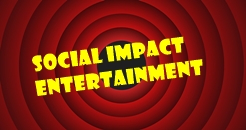 Social Impact Entertainment
Social Impact Entertainment
From an article by Nesta
In Poetics, one of the oldest surviving works of dramatic theory, Aristotle explores the link between theatrical performance and the resulting emotional response it provokes. The philosopher believed that theatre performed an important social function: that through a dramatised imitation of human life, theatre could prompt audiences to experience intense emotions - pity, fear - and in the process, undergo a catharsis.
In the modern era, we’re all familiar with the idea that entertainment media seeks to depict our world - through the documentation of real events or via fiction - and provoke some form of emotional response. Yet the effort to study, understand, and ultimately leverage that response is a comparatively recent trend.
The term social impact entertainment (SIE) broadly refers to entertainment media that aims to drive progressive social change - typically via raising awareness of an issue and then promoting some form of behaviour change on the part of the audience.
As of 2022, the term “SIE” is by no means universally accepted, with the exact definition of the label varying between users. TV shows, narrative (fiction) feature films and documentaries are commonly presented as works of SIE, but theatre, virtual reality, digital short form and even video games are among the media that could be considered as viable forms.
Despite this uncertain classification, over the past decade several institutions have published work that attempts to understand SIE as an emergent field of study. The SIE Society, founded by a group of influential filmmakers and producers, is an online platform that aims to be a central hub for SIE practitioners.
This is the classic "Hollywood" SIE approach:
-
Story first, impact second. Usually, a theme or screenplay or individual issue interest is the point of inception; what follows is a fully formed narrative entertainment property.
-
Once completed, an impact campaign is built around the movie/game/TV show etc., with most staff hired on the project coming from the entertainment world. At the core of this school of thought are creativity, artistic freedom, a sense of responsibility, sides, entertainers and a focus to not create didactic "infotainment", but stay competitive with the rest of the entertainment landscape.
-
Primary drivers are impact-minded mini-studios and production companies as well as artist-oriented accelerator programs.
-
A common guideline are the "five key considerations":
-
Focus on the story - tell the best story you can to reach your audience.
-
Know your issue - understand the real world of your story and determine your intended impact at the start.
-
Find the best partners - identify and partner with leading organisations and people working on your issue.
-
Think about distribution differently - create a distribution plan that activates all relevant shareholders, stakeholders and communities of action.
-
Evaluate, learn and share - assess what you have done and pass on key learnings.
One can think of examples of popular soap operas including issues in storylines but these need to matched with an impact campaign as well. This contrasts with the normal NGO approach of "Impact first, entertainment second".
Explore more here.
How can you use or make films/programmes which are social impact entertainment to help create change?
Retweet about this article:
From an article by Nesta, 22/02/2023